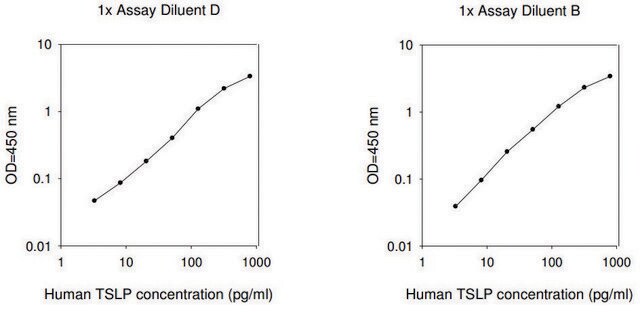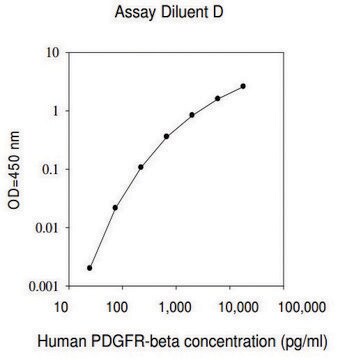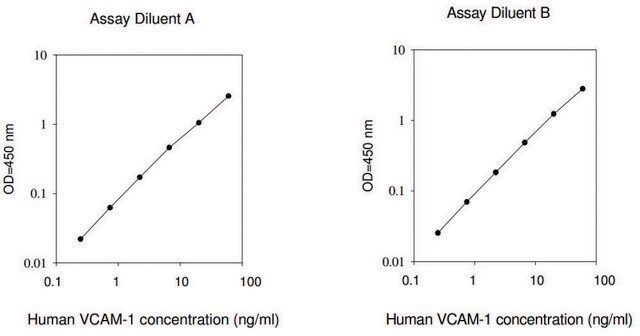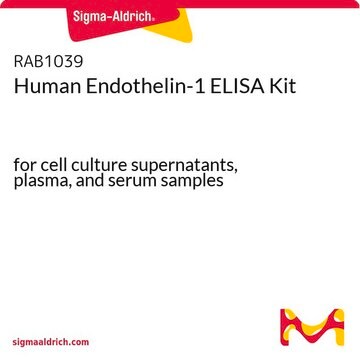Recommended Products
species reactivity
human
packaging
kit of 96 wells (12 strips x 8 wells)
technique(s)
ELISA: suitable
input
sample type cell culture supernatant(s)
sample type serum
sample type plasma
assay range
inter-assay cv: <12%
intra-assay cv: <10%
sensitivity: 14 pg/mL
standard curve range: 16.38-4000 pg/mL
detection method
colorimetric
shipped in
wet ice
storage temp.
−20°C
Gene Information
human ... SDC1(6382)
General description
The antibody pair provided in this kit recognize human Syndecan-1/CD138.
Application
For research use only. Not for use in diagnostic procedures.
Please refer to the attached General ELISA KIT Procedure (sandwich, competitive & Indirect ELISA)
Please refer to the attached General ELISA KIT Procedure (sandwich, competitive & Indirect ELISA)
Other Notes
A sample Certificate of Analysis is available for this product.
Please type the word sample in the text box provided for lot number.
Please type the word sample in the text box provided for lot number.
Signal Word
Warning
Hazard Statements
Precautionary Statements
Hazard Classifications
Met. Corr. 1
Storage Class Code
8A - Combustible corrosive hazardous materials
Flash Point(F)
Not applicable
Flash Point(C)
Not applicable
Choose from one of the most recent versions:
Already Own This Product?
Find documentation for the products that you have recently purchased in the Document Library.
Fumitaka Yanase et al.
Biomarkers : biochemical indicators of exposure, response, and susceptibility to chemicals, 25(6), 425-435 (2020-07-01)
Despite wide interest in glycocalyx biomarkers, their values in healthy individuals, patients after abdominal surgery, and septic patients have been poorly understood. We searched MEDLINE, CENTRAL and EMBASE for papers measured glycocalyx biomarkers in healthy individuals, patients after abdominal surgery
Lawrence N Diebel et al.
American journal of surgery, 217(6), 1076-1082 (2019-01-13)
Hyperglycemia promotes vascular inflammation; however its effect on endothelial dysfunction in sepsis is unknown. Microfluidic devices (MFD) may closely mimic the in vivo endothelial cell microenvironment. We hypothesized that stress glucose concentrations would increase sepsis related endothelial injury/activation. Human umbilical vein
Paola Orecchia et al.
Cancers, 11(9) (2019-08-25)
Epithelial ovarian cancer (EOC) is the fifth most common cancer affecting the female population. At present, different targeted treatment approaches may improve currently employed therapies leading either to the delay of tumor recurrence or to disease stabilization. In this study
Philippe Guerci et al.
Anesthesia and analgesia, 129(2), 598-607 (2018-11-20)
Glycocalyx shedding after traumatic hemorrhagic or septic shock, as well as different resuscitation fluids, has been causally linked to increased vascular barrier permeability (VBP) resulting in tissue edema. In nontraumatic hemorrhagic shock (NTHS), it remains questionable whether glycocalyx degradation in
Xuan Huang et al.
Frontiers in cell and developmental biology, 8, 599-599 (2020-08-08)
Mammographic density (MD) is a strong and independent factor for breast cancer (BC) risk and is increasingly associated with BC progression. We have previously shown in mice that high MD, which is characterized by the preponderance of a fibrous stroma
Our team of scientists has experience in all areas of research including Life Science, Material Science, Chemical Synthesis, Chromatography, Analytical and many others.
Contact Technical Service









